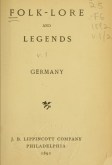Fastrada
German Folktale
By the side of the "Beautiful Doorway," leading into the cloisters of the cathedral at Mainz, stands, worked into the wall, a fragment of the tomb of Fastrada, the fourth wife of the mighty monarch Charlemagne according to some authorities, the third according to others. Fastrada figures in the following tradition related by the author of the Rhyming Chronicle.
When the Kaiser, Karl, abode at Zurich, he dwelt in a house called "The Hole," in front of which he caused a pillar to be erected with a bell on the top of it, to the end that whoever demanded justice should have the means of announcing himself. One day, as he sat at dinner in his house, he heard the bell ring, and sent out his servants to bring the claimant before him; but they could find no one. A second and a third time the bell rang, but no human being was still to be seen. At length the Kaiser himself went forth, and he found a large serpent, which had twined itself round the shaft of the pillar, and was then in the very act of pulling the bell rope.
"This is God's will," said the monarch. "Let the brute be brought before me. I may deny justice to none of God's creatures—man or beast."
The serpent was accordingly ushered into the imperial presence; and the Kaiser spoke to it as he would to one of his own kind, gravely asking what it required. The reptile made a most courteous reverence to Charlemagne, and signed in its dumb way for him to follow. He did so accordingly, accompanied by his court; and the creature led them on to the water's edge, to the shores of the lake, where it had its nest. Arrived there, the Kaiser soon saw the cause of the serpent's seeking him, for its nest, which was full of eggs, was occupied by a hideous toad of monstrous proportions.
"Let the toad be flung into the fire," said the monarch solemnly, "and let the serpent have possession of its nest restored to it."
This sentence was carried at once into execution. The toad was burnt, and the serpent placed in possession. Charlemagne and his court then returned to the palace.
Three days afterwards, as the Kaiser again sat at dinner, he was surprised at the appearance of the serpent, which this time glided into the hall unnoticed and unannounced.
"What does this mean?" thought the king.
The reptile approached the table, and raising itself on its tail, dropped from its mouth, into an empty plate which stood beside the monarch, a precious diamond. Then, again abasing itself before him, the crawling creature glided out of the hall as it had entered, and was speedily lost to view. This diamond the monarch caused to be set in a costly chased ring of the richest gold; and he then presented the trinket to his fair wife, the much-beloved Fastrada.
Now this stone had the virtue of attraction, and whoso received it from another, so long as they wore it, received also the intensest love of that individual. It was thus with Fastrada, for no sooner did she place the ring on her finger than the attachment of Charlemagne, great before, no longer knew any bounds. In fact his love was more like madness than any sane passion. But though this talisman had full power over love, it had no power over death; and the mighty monarch was soon to experience that nothing may avert the fiat of destiny.
Charlemagne and his beloved bride returned to Germany, and, at Ingelheim palace, Fastrada died. The Kaiser was inconsolable. He would not listen to the voice of friendship, and he sorrowed in silence over the dead body of his once beautiful bride. Even when decay had commenced, when the remains, late so lovely, were now loathsome to look on, he could not be induced to leave the corpse for a moment, or to quit the chamber of death in which it lay. The court were all astounded. They knew not what to make of the matter. At length Turpin, Archbishop of Rheims, approached the corpse, and being made aware of the cause, by some supernatural communication contrived to engage the emperor's attention while he removed the charm. The magic ring was found by him in the mouth of the dead empress, concealed beneath her tongue.
Immediately that the talisman was removed the spell was broken, and Charlemagne now looked on the putrid corpse with all the natural horror and loathing of an ordinary man. He gave orders for its immediate interment, which were at once carried into execution, and he then departed from Ingelheim for the forest of the Ardennes. Arrived at Aix-la-Chapelle, he took up his abode in the ancient castle of Frankenstein, close by that famous city. The esteem, however, that he had felt for Fastrada was now transferred to the possessor of the ring, Archbishop Turpin; and the pious ecclesiastic was so persecuted by the emperor's affection that he finally cast the talisman into the lake which surrounds the castle.
An immediate transference of the royal liking took place, and the monarch, thenceforth and for ever after during his lifetime, loved Aix-la-Chapelle as a man might love his wife. So much did he become attached to it, that he directed that he should be buried there; and there accordingly his remains rest unto this day.
Folk-lore and Legends: Germany

Notes: Contains 30 German folktales.
Author: Charles John Tibbitts
Published: 1892
Publisher: W. W. Gibbings, London